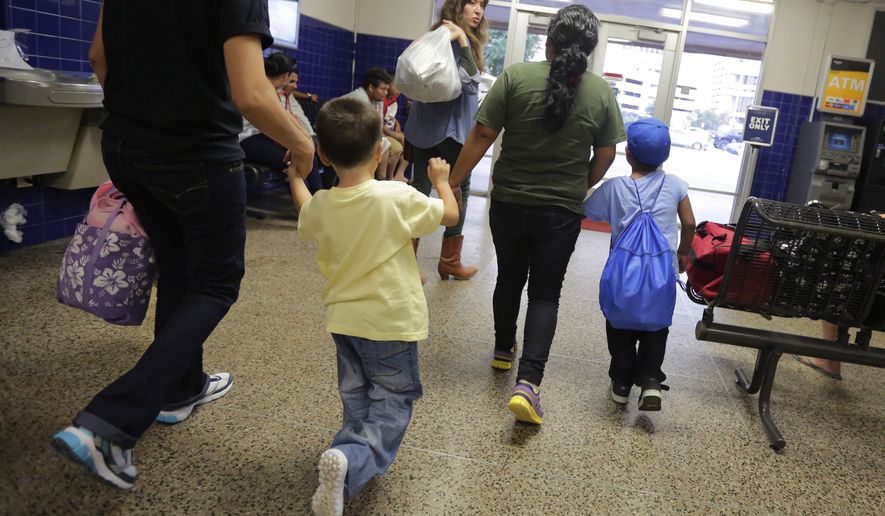Illegal immigrants are kidnapping children and bringing them across the border, hoping to appear to be families so they can take advantage of lax enforcement policies, the Obama administration told a federal appeals court this week.
Leon Fresco, a deputy assistant attorney general who handles immigration cases, made the stunning claim as he defended the administration’s policy of detaining illegal immigrant parents and children caught traveling together as they jump the border. After a federal judge last year ordered the families quickly released, Mr. Fresco said it’s served as an enticement for kidnapping.
“When people now know that when I come as a family unit, I won’t be apprehended and detained — we now have people being abducted so that they can be deemed as family units, so that they can avoid detention,” Mr. Fresco told the 9th Circuit Court of Appeals.
He did not back up that claim in court, and did not respond to a follow-up email seeking comment. U.S. Immigration and Customs Enforcement, the agency that handles detention and deportation, declined to comment, citing the ongoing case, while Customs and Border Protection, which guards the border, did not respond to a request for comment.
But Peter Schey, the lawyer who argued in court on behalf of the families, and is in touch with hundreds of families as part of the lawsuit, said there’s no evidence to back up Mr. Fresco’s claim.
“We know zero instances of that, and there’s zero support for that anywhere in the record,” he said. “If they know of any such instances, I would think they would bring the actual instances to the attention of the court.”
How to treat the illegal immigrant families is just one of the thorny questions raised by the surge of illegal immigrants fleeing Central America over the last few years.
Most of the attention has gone to the unaccompanied minors who have arrived by the tens of thousands. Under a 1990s-era legal agreement known as the Flores settlement, the children are required to be quickly processed and released to social workers, and eventually placed with family or other sponsors.
But even more of the Central American illegal immigrants are now coming as family units — a parent and children traveling together — and the rules for handling them are hotly debated.
The Obama administration opened several new detention facilities to hold the families, hoping to quickly deport them, sending a message back to El Salvador, Guatemala and Honduras that the journey north would be for naught.
Mr. Schey and other immigrant rights advocates, however, challenged the detention, arguing the families were being held in jail-like facilities unsuitable for children. They argued the Flores agreement required better treatment.
Last year, Judge Dolly M. Gee agreed, and ordered all of the children quickly processed and released. In cases where they came with a parent, she said it usually made sense to release the parent too, because that was in the best interests of the children.
The Obama administration warned that would lead to a new surge of illegal immigration, and the numbers bear that out, with fiscal year 2016 on track to set a record for family units caught trying to jump the border.
Mr. Fresco, arguing to the 9th Circuit Court of Appeals on Tuesday, said the Flores agreement was only supposed to apply to unaccompanied minors, not to those who arrive as part of a family. He said that was the understanding for more than a decade, and immigrant rights activists have only recently sought a new interpretation.
But Judge Andrew D. Hurwitz said the agreement seems clear.
“On the face of the agreement, it sure seems to apply to all minors,” he said.
Still, he said Judge Gee’s order pushing all mothers to be released along with their children goes beyond the Flores settlement’s wording. He wondered if there wasn’t a middle ground that prohibited the government from treating mothers with children worse than other illegal immigrants, but stopped short of ordering their quick release.
“Our only concern, and the court’s only concern, was that they were treating the mothers in a way that they weren’t treating anybody else in the United States,” Mr. Schey told the judges.
Immigration policy has become ever more fragmented under President Obama, and both sides of the debate are increasingly turning to the federal courts to try to sort it out.
In Texas, a federal judge last month ordered Justice Department lawyers to undergo remedial ethics training after he decided the lawyers repeatedly misled his court about Mr. Obama’s 2014 deportation amnesty, known as deferred action.
On Tuesday, however, Judge Andrew S. Hanen stayed his own order, saying he wanted the Justice Department to suggest its own punishment.
He also stayed his order that would have forced the administration to turn over the names of some 50,000 illegal immigrants who were approved for three-year work permits and stays of deportation under the 2014 policy.
Judge Hanen has set a new hearing for the end of August to revisit the issue.
By then, the Supreme Court is likely to have ruled on the legality of the overall amnesty program.
• Stephen Dinan can be reached at sdinan@washingtontimes.com.




Please read our comment policy before commenting.